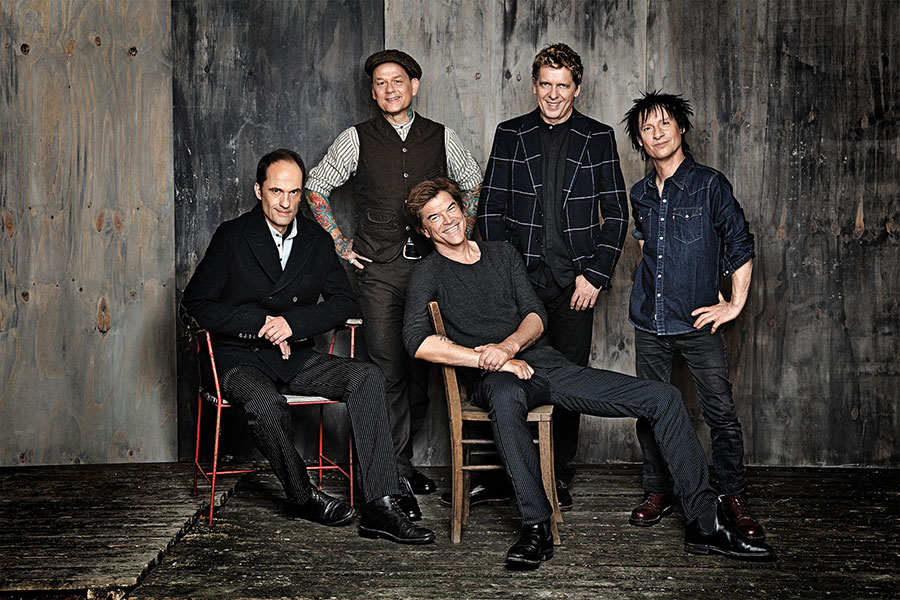Not unlike their German language music colleagues Rammstein, language does not limit the appeal of Die Toten Hosen. In the German-speaking world, they are major rock stars and they are pretty well known in the rest of the world, too. For nearly 40 years the quintet from Düsseldorf has won rock and punk fans over with their catchy tunes. Their lyrics range from the socially and politically aware to the mundane observations on everyday life. This month, let’s rock out and learn the German language with the music of Die Toten Hosen!
Get to Know Die Toten Hosen
Die Toten Hosen formed in 1982 when Campino (vocalist, guitarist) and Kuddel (guitar), of the band ZK, joined forces with Andi (bassist), Breiti (guitar), Trini Trimpop (drums), and Walter November (guitar). By the following year, November had departed the band. In 1985, Trimpop left the lineup to become the band’s manager and was replaced by Wölli, who remained in the band until injuries in a car accident forced him to leave in 1999. That is when English drummer Vom joined the group. Got all that?
In short: the band’s current line-up consists of Campino, Andi, Breiti, Kuddel, and Vom.
If you are wondering about the name, Die Toten Hosen means, literally, “the dead pants.” But, what the phrase is an expression for saying that there is nothing going on.
The Music of Die Toten Hosen
After forming in 1982, Die Toten Hosen lost no time releasing their first single, “Wir sind bereit,” the same year. Opel-Gang, their debut full-length, was released the following year. The band remained busy, releasing almost a record a year with 1984’s Unter falscher Flagge, 1986’s Damenwahl, and 1987’s Never Mind the Hosen, Here’s Die Roten Rosen.
But it was 1988’s Ein kleines bisschen Horrorschau when things began to take off commercially. The album, which includes the track “Hier kommt Alex,” reached the third spot on the German charts. 1990’s Auf dem Kreuzzug ins Glück hit the top of the charts in Germany.
It is a feat that the band have repeated with all but one of their German language albums to date: 1993’s Kauf MICH!, 1996’s Opium fürs Volk, 1999’s Unsterblich, 2002’s Auswärtsspiel, 2004’s Zurück zum Glück, 2008’s In aller Stille, 2012’s Ballast der Republik, and 2017’s Laune der Natur. The exception is 1998’s Wir warten auf’s Christkind…, a collection of Christmas songs, “only” peaked at number four on the German charts.
I say “German language albums.” The band has released an album of English language punk rock covers that is cleverly titled Learning English, Lesson One. And, as you might expect in so many decades in existence, they have also put out a number of live albums.
These days, Die Toten Hosen is a relatively mainstream rock band with big hits like Tage wie diese. (Chancellor Angela Merkel’s CDU party used the song during celebrating the 2013 federal elections. The band criticized the usage and Merkel later apologized.) But the farther back you go in their discography you will find more raw tracks with a punk sound. 1996’s “Zehn kleine Jägermeister,” the band’s biggest hit, is a mix of a reggae meets punk tune that just happens to be a drinking song. Or 2000’s “Bayern,” where the proud Düsseldorf band proclaim their disdain for soccer team FC Bayern Munich.
Looking for another Ohrwurm to help you learn German? Check out previously featured musicians and bands!
Photo by GABO Photos, courtesy of KKT. This post contains affiliate links.

Pingback: German Music: Sportfreunde Stiller - Reverberations blog
Pingback: German Music: Punk Rock Trio Die Ärzte - Reverberations